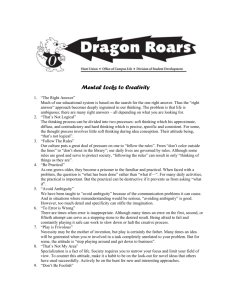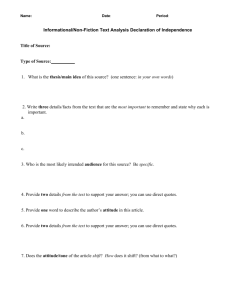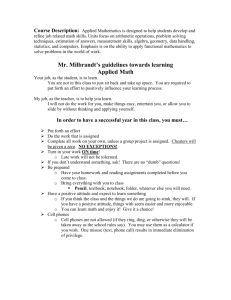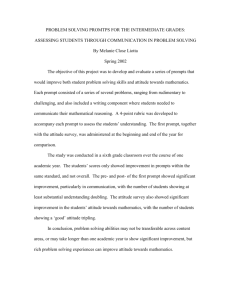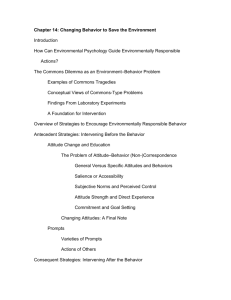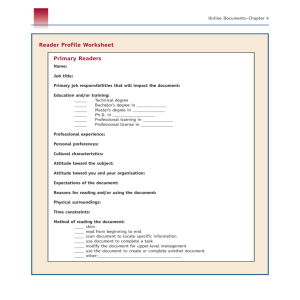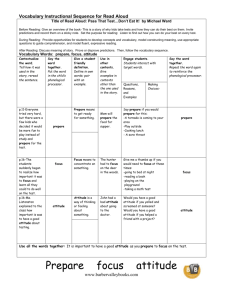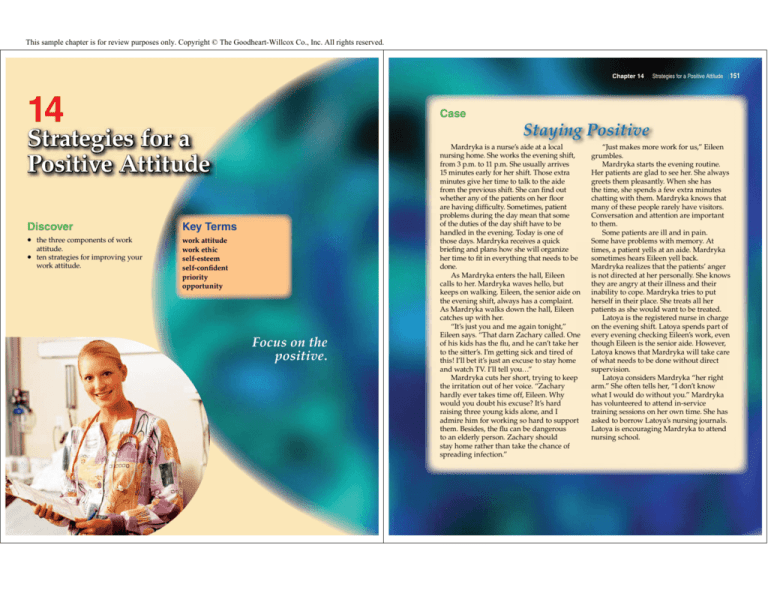
This sample chapter is for review purposes only. Copyright © The Goodheart-Willcox Co., Inc. All rights reserved.
150
Part 3
Chapter 14
Succeeding on the Job
14
151
Case
Staying Positive
Strategies for a
Positive Attitude
Discover
Key Terms
u the three components of work
work attitude
work ethic
self-esteem
self-confident
priority
opportunity
attitude.
u ten strategies for improving your
work attitude.
Strategies for a Positive Attitude
Focus on the
positive.
Copyright by Goodheart-Willcox Co., Inc.
Mardryka is a nurse’s aide at a local
nursing home. She works the evening shift,
from 3 p.m. to 11 p.m. She usually arrives
15 minutes early for her shift. Those extra
minutes give her time to talk to the aide
from the previous shift. She can find out
whether any of the patients on her floor
are having difficulty. Sometimes, patient
problems during the day mean that some
of the duties of the day shift have to be
handled in the evening. Today is one of
those days. Mardryka receives a quick
briefing and plans how she will organize
her time to fit in everything that needs to be
done.
As Mardryka enters the hall, Eileen
calls to her. Mardryka waves hello, but
keeps on walking. Eileen, the senior aide on
the evening shift, always has a complaint.
As Mardryka walks down the hall, Eileen
catches up with her.
“It’s just you and me again tonight,”
Eileen says. “That darn Zachary called. One
of his kids has the flu, and he can’t take her
to the sitter’s. I’m getting sick and tired of
this! I’ll bet it’s just an excuse to stay home
and watch TV. I’ll tell you…”
Mardryka cuts her short, trying to keep
the irritation out of her voice. “Zachary
hardly ever takes time off, Eileen. Why
would you doubt his excuse? It’s hard
raising three young kids alone, and I
admire him for working so hard to support
them. Besides, the flu can be dangerous
to an elderly person. Zachary should
stay home rather than take the chance of
spreading infection.”
Copyright by Goodheart-Willcox Co., Inc.
“Just makes more work for us,” Eileen
grumbles.
Mardryka starts the evening routine.
Her patients are glad to see her. She always
greets them pleasantly. When she has
the time, she spends a few extra minutes
chatting with them. Mardryka knows that
many of these people rarely have visitors.
Conversation and attention are important
to them.
Some patients are ill and in pain.
Some have problems with memory. At
times, a patient yells at an aide. Mardryka
sometimes hears Eileen yell back.
Mardryka realizes that the patients’ anger
is not directed at her personally. She knows
they are angry at their illness and their
inability to cope. Mardryka tries to put
herself in their place. She treats all her
patients as she would want to be treated.
Latoya is the registered nurse in charge
on the evening shift. Latoya spends part of
every evening checking Eileen’s work, even
though Eileen is the senior aide. However,
Latoya knows that Mardryka will take care
of what needs to be done without direct
supervision.
Latoya considers Mardryka “her right
arm.” She often tells her, “I don’t know
what I would do without you.” Mardryka
has volunteered to attend in-service
training sessions on her own time. She has
asked to borrow Latoya’s nursing journals.
Latoya is encouraging Mardryka to attend
nursing school.
152
Part 3
Chapter 14
Succeeding on the Job
Name ________________________________________________
Strategies for a Positive Attitude
153
Analyze
Case Discussion
After you have read the case Staying Positive, write your answers to
the following discussion questions.
1. Describe Mardryka’s attitude toward her job.
______________________________________________________________
______________________________________________________________
______________________________________________________________
2. Describe Eileen’s attitude toward her job.
______________________________________________________________
______________________________________________________________
______________________________________________________________
3. What does Mardryka do to keep a positive attitude under
difficult situations?
______________________________________________________________
______________________________________________________________
______________________________________________________________
4. How does high self-esteem help Mardryka have a positive attitude
at work?
_____________________________________________________________
_____________________________________________________________
_____________________________________________________________
_____________________________________________________________
5. What advice would you give to Eileen to help her improve her
attitude toward work?
______________________________________________________________
______________________________________________________________
______________________________________________________________
______________________________________________________________
6. Give an example to illustrate each of the strategies.
______________________________________________________________
______________________________________________________________
______________________________________________________________
______________________________________________________________
Everyone’s life—home, school, work, and social—is full of ups and
downs. It is normal to feel positive at some times and negative at others.
How can you stay positive at work? First, understand what makes up
your work attitudes. Then develop ways to help you maintain a positive
work attitude.
Work Attitudes
Your work attitude has three components: attitude toward self,
attitude toward work, and attitude toward the workplace.
Attitude toward Self
The way you feel about yourself has a major effect on how you feel
about work. Attitude toward self is often called self-esteem. When your
self-esteem is high, you feel good about your self. You are self-confident.
You know you can handle any task that comes your way.
Your level of self-esteem affects how you deal with people and
situations. When your self-esteem is high, you can see other people
as equals and coworkers, not threats. It is easier to sympathize and
understand what others are feeling. When your self-esteem is low, you
tend to see other people as threats. You might not be able to sympathize
with others or be understanding.
Think about Eileen’s and Mardryka’s responses to Zachary’s absence.
Mardryka’s self-esteem enabled her to defend Zachary. Why? She doesn’t
need to put down another person to feel good about herself because she
already feels good about herself. As a result, she is able to see another
person’s side of things. She gives Zachary the benefit of the doubt and
believes his reason for being absent. She also thinks about the welfare of
the patients. Being exposed to the flu would be bad for them. Instead of
being angry about doing more work, she feels good about filling in for
Zachary.
self-esteem. The
feeling of self-worth;
feeling self-confident.
self-confident. The
feeling of being sure
of one’s abilities.
Attitude toward Work
A person’s attitude toward work is often called his or her work ethic.
People with a good work ethic feel that work is important. They want
to get their work done on time and at a high quality. They don’t expect
work to always be easy. They get satisfaction from doing a good job, and
they feel that the work itself is rewarding. People with a good work ethic
are willing to pitch in when problems arise and are willing to put in
extra hours when asked.
When Eileen heard that Zachary was not coming in, she was angry.
She did not want to do any extra work. Eileen dislikes her work. Her
work ethic is poor.
______________________________________________________________
______________________________________________________________
Copyright by Goodheart-Willcox Co., Inc.
work attitude.
Attitude toward
work that has
three components:
attitude toward self,
attitude toward work
(work ethic), and
attitude toward the
workplace.
Copyright by Goodheart-Willcox Co., Inc.
work ethic. A
person’s attitude
toward his or her job.
154
Part 3
Chapter 14
Succeeding on the Job
Attitude toward the Workplace
3. Focus on the Positive
Attitude toward the workplace means how you feel about the
company or organization you work for. A positive attitude means that
you respect the organization and the people who work there. You respect
the company’s products and are proud to tell people about your work.
Latoya could tell that Mardryka had a positive attitude toward
the nursing home. She knew that Mardryka was committed to the
nursing home’s professional goal of serving elderly people. She saw that
Mardryka cared about the patients and gave of herself. Doing the job
means more to Mardryka than just earning a paycheck.
No job is perfect, and every job has its ups and downs. It is never
easy to be positive all the time. The following are ten strategies that
many people use to maintain a positive attitude.
If one aspect of your job gets you down, don’t let it overshadow the
positive aspects. Mardryka did not enjoy working with cranky patients.
However, when her patients were irritable, she tried to make them feel
better. Her focus was on the good she could do each day. She used
her skills to make others feel better. It gave her satisfaction when they
greeted her warmly. She felt that putting up with the occasional cranky
patient was worth all the times when she felt good about her job.
Focus on the positive in your work and in your relationships on the
job. Remember, you can have good working relationships with everyone,
even with those who differ from you in many ways. Focus on the values
and goals you share, such as building a productive department.
1. Examine Your Attitude Regularly
Think about your day at work. Think about your relationships with
your coworkers and supervisors. Is your attitude positive or negative?
constructive or destructive?
If your attitude is negative, try to determine why. Ask yourself these
questions:
u Am I unsuited for my job?
u Are personal problems interfering with my work performance?
u Do I dislike my coworkers or supervisor?
u Do I need more training to perform my tasks effectively?
u How can I change destructive attitudes to constructive ones?
If your attitude is positive, are you projecting that attitude to others?
Most likely, you will discover one or two areas where you need to adjust
your attitude. Ask yourself these questions:
u How would my supervisor describe me?
u How would my coworkers rate my human relations skills?
You may love your job but find that certain people or tasks cause you
problems. When you find a problem, you can work to fix it.
4. Communicate
Communication is your link with others. When you feel isolated at
home or at work, your lines of communication need to be repaired. It’s
hard to keep a positive attitude if you feel misunderstood.
Practice good listening and communication skills every day. Be sure
that you say what you mean and that you hear what others are saying.
Ask questions if you do not understand something. When you give
directions, make sure your listeners understand you. Ask them to repeat
your instructions back to you or to explain what you just told them.
5. Turn Unexpected Changes into
Opportunity
Human beings are creatures of habit. It is the rare person who likes,
suprises. We are comfortable with the familiar—friends, supervisors,
coworkers, routines, foods. However, change is an inevitable part of life. If
2. Balance Work with Personal Life
priority. Something
that is more
important than other
things.
Strategies for a Positive Attitude
All work and no play is not healthy, but all play and no work is not
good either. Only you can decide how to allocate your time and energy.
Figure out a balance that works for you. Decide on your priorities. When
you know your priorities, it is easier to make the decisions that are right
for you.
When you are at home, focus on your family and friends. Leave
work problems at work. Similarly, when at work, put home problems on
a back burner. Focus on your work. If you do not feel stressed about your
priorities, it is easier to maintain a positive attitude toward work.
Copyright by Goodheart-Willcox Co., Inc.
Copyright by Goodheart-Willcox Co., Inc.
155
156
Part 3
Chapter 14
Succeeding on the Job
you stay in a job long enough, some unforeseen changes are sure to happen.
Companies are bought and sold. Managers and coworkers come and go.
Your duties change. New company policies go into effect.
Your first reaction to changes at work may be negative. You might not
like a new boss or a new assignment. However, you can learn to accept
change and remain positive. Focus on what you can learn. Be honest if
something is bothering you, and talk to your supervisor about it. Every
new situation can be a learning experience if you are open to learning.
What you might learn is how to adapt to something you don’t like. Adopt
opportunity. Chance the attitude that every change presents a new opportunity to grow.
for success.
6. Educate Yourself
It’s tough to be positive if you are having trouble doing your job.
Education is the key to being confident about your abilities. You can take
courses to keep up with your field. You can read articles and new books
by experts in the field. Mardryka pursued her education in both ways,
by taking in-service training and by reading nursing journals.
Education is necessary for advancement in many careers. Even if that
is not the case, education is never wasted. Be a lifelong learner. The more
you learn, the more confident you will be.
7. Maintain Your Interest
In the first months on a job, you are learning new things.
The excitement and challenge keep you interested, and your attitude is
positive.
As time goes on, you might begin to feel bored. You might feel that
you are not being challenged, or that the work is not as much fun as you
expected. If this happens, look for ways to regain the interest you once
felt. Analyze your job duties. Look for areas where you can take more
initiative. Come up with new ideas for doing routine tasks.
Supervisors count on workers with initiative and enthusiasm to
show new employees the ropes. If Latoya were looking for an employee
to train a newly hired aide, would she ask Mardryka or Eileen? Eileen
may be the senior aide, but she no longer has any enthusiasm for her
job. Her negative attitude affects her relationships with the patients,
supervisors, and other aides.
the lighter side of situations. People with a good sense of humor can say
just the right thing to make everyone laugh and break the tension. Find
someone with a good sense of humor, and learn by observation.
9. Take Care of Your Health
Poor health habits can affect your job performance and your attitude.
The negative effects of poor health habits might not happen immediately;
but over time, such habits can reduce your productivity on the job. An
occasional candy bar for lunch will not ruin your health, but a steady
diet of junk food will sap your energy.
Staying up too late every night will affect your ability to be alert
the next day. A lack of exercise may result in a buildup of tensions and
lack of energy. Abuse of alcohol and drugs will impair your ability to
perform. In most workplaces, use of alcohol or any illegal substances on
the job is grounds for immediate dismissal.
10. Dress for Success
Your attitude and your appearance are related. If you look good, you
are more likely to feel good about yourself. Everyone has a favorite outfit
that can improve a mood instantly. Choose clothes that make you feel
good about yourself.
Your appearance also affects others’ opinions of you and their
reactions to you. Be aware of the dress code for your job. Pay attention to
personal hygiene and grooming.
A supervisor might make decisions about your future based on how
you dress and your grooming. He or she may or may not ever mention
this to you. The supervisor may not even be aware of how your hygiene
and grooming affect his or her opinions of you. It is up to you to show
your feelings about yourself, your position, and your workplace by
presenting an appropriate image.
8. Maintain a Sense of Humor
Humor can help your outlook on almost anything. Taking yourself
and others too seriously will not solve problems. It may cause you to
dwell on mistakes or focus on the negative side of situations that cannot
be changed. Having a sense of humor does not mean joking or clowning
around. Having a sense of humor means developing the ability to see
Copyright by Goodheart-Willcox Co., Inc.
Strategies for a Positive Attitude
Copyright by Goodheart-Willcox Co., Inc.
157
158
Part 3
Chapter 14
Succeeding on the Job
Name ___________________________________________________
Strategies for a Positive Attitude
159
Name ___________________________________________________
Apply
Review
Case: Torn between Two Priorities
True or False
You are in competition for a promotion at work. At the same time,
your family is moving to a new home. Your boss keeps asking you
to come in on Saturdays to help with a special project. Your family is
counting on you to organize the move and help pack. You are exhausted
because of the physical and mental demands that are being placed on
you. You are torn between your need to spend time at home and your
desire to advance.
Circle T if the statement is true or F if the statement is false.
T F 1. If a person is in the proper job, he or she will always be
positive about that job.
Case Discussion
1. List three options for dealing with your job situation.
Option 1: __________________________________________________________
___________________________________________________________________
___________________________________________________________________
Option 2: __________________________________________________________
___________________________________________________________________
___________________________________________________________________
Option 3: __________________________________________________________
___________________________________________________________________
___________________________________________________________________
T
F
2. Low self-esteem can interfere with job performance.
T
F
3. There is one right way to balance the demands of work and
home.
T
F
4. People who are different from each other can have good
work relationships.
T
F
5. Most people respond happily to unexpected changes in their
life.
T
F
6. The only way to learn something new is to return to school.
T
F
7. A worker’s initiative and interest may lessen after some time
on the job.
T
F
8. Having a sense of humor at work means making fun of
coworkers.
T
F
9. A poor diet and lack of exercise will sap your energy and
make it harder to be productive.
T
F
10. People often judge others by their appearance.
2. List the option you would choose, and explain why you would
choose it.
___________________________________________________________________
___________________________________________________________________
___________________________________________________________________
___________________________________________________________________
___________________________________________________________________
___________________________________________________________________
___________________________________________________________________
___________________________________________________________________
___________________________________________________________________
___________________________________________________________________
___________________________________________________________________
Copyright by Goodheart-Willcox Co., Inc.
Copyright by Goodheart-Willcox Co., Inc.
160
Part 3
Chapter 14
Succeeding on the Job
Strategies for a Positive Attitude
161
Name ___________________________________________________
Check Your Understanding
Journal Writing
1. List the three components of work attitude.
______________________________________________________________
______________________________________________________________
______________________________________________________________
______________________________________________________________
______________________________________________________________
______________________________________________________________
______________________________________________________________
______________________________________________________________
2. Why is it a good idea to examine your attitude regularly?
______________________________________________________________
1. Your work attitude includes attitude toward self, work, and the
workplace. Analyze your work attitude. If you do not work, use your
attitude toward school instead.
_____________________________________________________________
_____________________________________________________________
_____________________________________________________________
_____________________________________________________________
_____________________________________________________________
_____________________________________________________________
_____________________________________________________________
_____________________________________________________________
______________________________________________________________
_____________________________________________________________
2. Describe a difficult situation when you needed to maintain a positive
attitude, even though it was difficult. What strategies did you use?
_____________________________________________________________
______________________________________________________________
_____________________________________________________________
______________________________________________________________
_____________________________________________________________
______________________________________________________________
_____________________________________________________________
______________________________________________________________
_____________________________________________________________
______________________________________________________________
_____________________________________________________________
______________________________________________________________
_____________________________________________________________
3. List the ten strategies you can use to improve your attitude.
______________________________________________________________
_____________________________________________________________
______________________________________________________________
_____________________________________________________________
3. Describe how you could use each of the ten strategies to improve
your attitude.
_____________________________________________________________
______________________________________________________________
_____________________________________________________________
______________________________________________________________
_____________________________________________________________
______________________________________________________________
_____________________________________________________________
______________________________________________________________
_____________________________________________________________
______________________________________________________________
_____________________________________________________________
______________________________________________________________
_____________________________________________________________
______________________________________________________________
______________________________________________________________
_____________________________________________________________
_____________________________________________________________
_____________________________________________________________
Copyright by Goodheart-Willcox Co., Inc.
Copyright by Goodheart-Willcox Co., Inc.



